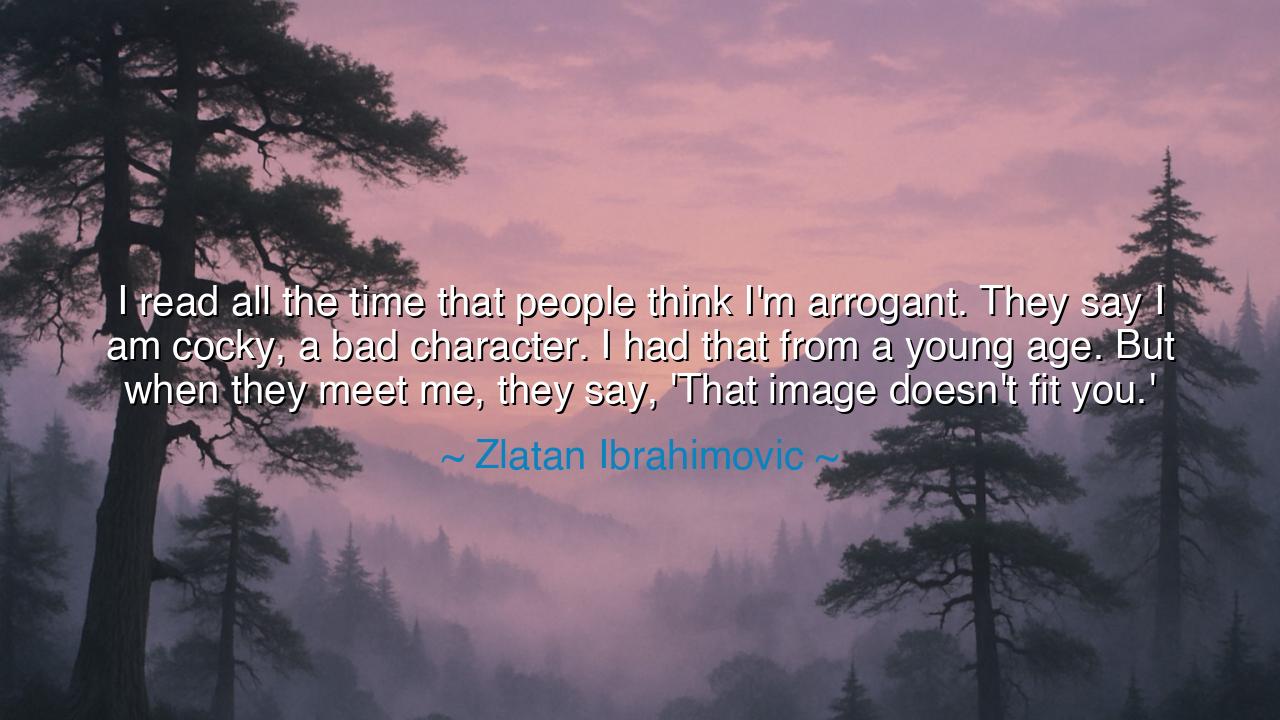
I read all the time that people think I'm arrogant. They say I am
I read all the time that people think I'm arrogant. They say I am cocky, a bad character. I had that from a young age. But when they meet me, they say, 'That image doesn't fit you.'






In the world of public perception, few things are as powerful as image. It shapes how we are seen, how we are treated, and sometimes, how we even see ourselves. Yet, as Zlatan Ibrahimovic reveals in his words, "I read all the time that people think I'm arrogant. They say I am cocky, a bad character. I had that from a young age. But when they meet me, they say, 'That image doesn't fit you.'" Here, Zlatan speaks of the disconnect between how others perceive him and how he truly is. It is a reminder that identity is often shaped not by the truth of a person’s character, but by the stories told about them, stories that are influenced by societal expectations and the labels that others place upon us. In the world of constant judgment, misunderstandings can easily arise, yet the truth of who we are is often far more complex and nuanced than the labels we are given.
The ancients knew well the power of reputation. In ancient Greece, the philosophers warned about the importance of not allowing the opinions of others to define one's worth. Socrates, in his dialogues, often spoke of the importance of self-examination and virtue, rejecting the shallow judgments of society. He believed that while the crowd may quickly label a person based on outward appearances or actions, it is only through self-knowledge and integrity that one can truly understand their own value. In this sense, Zlatan’s frustration with being misjudged resonates with the wisdom of Socrates: we must not let the labels others place upon us distort our true selves.
Consider the example of Alexander the Great, a figure who was both admired and feared by those around him. He was often seen as arrogant and uncompromising, yet his ambition, determination, and genius were undeniable. Many who encountered him saw a leader driven by a passion for conquest and a vision of greatness. Yet, behind the tough exterior, there was a man who struggled with loneliness, with the burden of leadership, and with the consequences of his actions. Alexander’s image—as a conqueror—was shaped by the circumstances in which he lived, but his character was far more layered. His arrogance, like Zlatan’s, was misunderstood by many who saw only the surface, without delving into the complexities of his true nature.
Zlatan himself embodies the dual nature of self-perception and societal judgment. His confidence on the field, his swagger, and his bold statements have made him an icon of self-assurance. To some, this might come across as arrogance, a flaw to be judged and criticized. Yet, for those who have met him, they recognize that the image others perceive is only a small part of who he truly is. Beneath the cocky exterior, Zlatan’s self-awareness and humility are revealed. He has often spoken about his love for the game, his respect for teammates, and his commitment to excellence. The contradiction between his public persona and his private character is a powerful reminder that we must not be too quick to judge the whole of a person based on a single dimension or fleeting moments of public behavior.
The lesson here is one of understanding and self-acceptance. Just as Socrates advocated for the importance of self-knowledge, so too must we strive to understand our own character beyond the judgments others place upon us. In a world full of misunderstandings, it is vital to stay true to ourselves and allow others the opportunity to see who we truly are. At the same time, we must also recognize the complexity of others. Zlatan Ibrahimovic reminds us that arrogance and confidence are often just two sides of the same coin, and a person’s actions or words may not always reflect their true intentions or heart.
We are constantly told to manage our image in a world that thrives on first impressions and surface-level judgments. But the true strength lies in self-awareness and authenticity. We should seek to know ourselves and allow others to know us—not through the lens of what they have heard or perceived, but through direct experience and genuine connection. In this, we will not only foster deeper understanding but also live with a sense of peace, free from the need to constantly defend or correct the misunderstandings of the world around us.
Therefore, let us not be quick to judge others based on their image, nor let us be too easily swayed by the opinions of those who do not know us. As Zlatan shows us, there is more to a person than meets the eye. Let us instead seek to connect with others at a deeper level, to see beyond the surface and appreciate the complexity that lies within each person. In doing so, we honor not only others but ourselves, living with a clarity and authenticity that is untouched by the fleeting judgments of the world.






AAdministratorAdministrator
Welcome, honored guests. Please leave a comment, we will respond soon